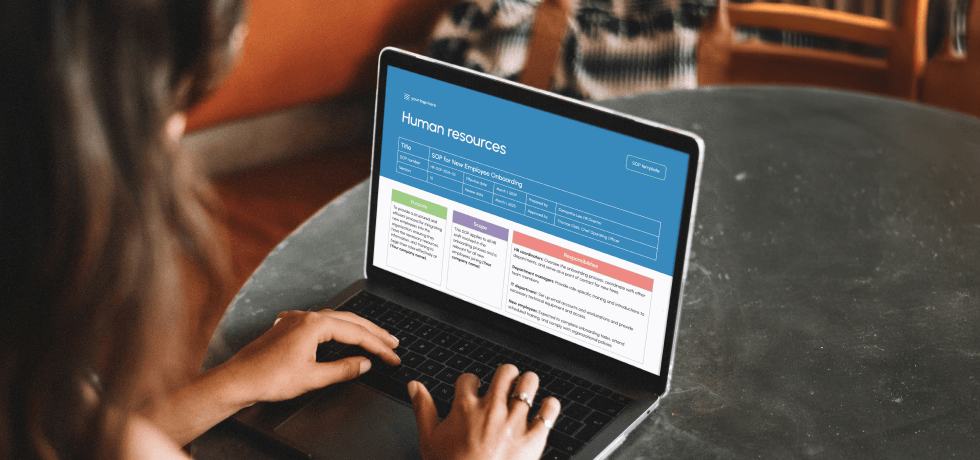
Let’s kick off this article with a quick reality check: since returning customers are more likely to make a purchase, running a successful marketing campaign to retain them is often more cost-effective than creating one to attract new customers.
Not to mention that repeat customers spend 67% more than new ones. If your focus has been on constant customer acquisition, it’s time to rethink your strategy.
Customer loyalty isn’t guaranteed by great products alone. Customers expect quick responses, personalized experiences, and seamless interactions. That’s where customer retention tools step in, helping businesses deliver tailored experiences that keep people coming back, whether it’s through AI-driven insights or automated follow-ups.
Let’s dive into how you can turn occasional buyers into lifelong fans.
Why customer retention matters
Why is customer retention the real MVP for any business looking to grow without burning through cash? First off, it slashes sky-high acquisition costs. Spending less to bring in new customers means putting more resources into the ones already invested in your brand.
This brings us to the sweet spot — customer lifetime value (CLV). Retained customers spend more and are more likely to come back for larger purchases. In fact, increasing customer retention by just 5% can boost profits by 25% to 95%. Not only are they coming back; they’re also boosting your brand’s credibility.
The best part? Loyal customers are less price-sensitive and more forgiving when minor issues arise. Over 84% of consumers say they’re more likely to stay loyal to a brand that treats them like a person, not a number. So, when you prioritize retention, you’re building a customer base that isn’t easily swayed by the competition.
Essential features of customer retention tools
When choosing between customer retention tools, you want features that do more than just manage contacts—they should make retention feel effortless and effective. Here’s a breakdown of what to look for:
- Automation: This takes repetitive tasks off your plate, like sending follow-up emails or birthday messages. It keeps customers engaged consistently without requiring constant manual input. Good customer retention tools also help catch issues early—like re-engaging a customer who hasn’t shopped in a while—keeping your brand top of mind effortlessly.
- Analytics & reporting: Sales analytics give you a clear view of what’s working and what’s not. Detailed reports on customer behavior, purchase frequency, and feedback help you understand trends and fine-tune your approach. Data-driven insights achieve maximum impact and bypass guesswork.
- Personalized communication: Customers seek experiences that feel tailored to their profile. Customized messaging (using a customer’s name, purchase history, or preferences) makes interactions feel personal. This keeps them engaged, ultimately building a lasting connection.
- Integration with other platforms: A retention tool should connect seamlessly with your CRM, email marketing, or social media platforms. Syncing data across systems ensures customer info stays up-to-date. With everything in one place, you save time and ensure no lead falls through the cracks.
- Customer feedback & surveys: Feedback allows you to address customer pain points quickly and shows that you value their opinions. In the long run, it reduces churn and amplifies loyalty.
Top 21 customer retention tools and software
| Tool | Category | Starting price | Stand-out feature |
|---|---|---|---|
| ClickUp | Customer relationship management (CRM) | $7/user/mo | Combines CRM features with project management |
| Salesforce | Customer relationship management (CRM) | $25/user/mo | Comprehensive CRM with AI (Einstein) |
| Productive | Customer relationship management (CRM) | $9/user/mo | Integrated CRM, project & finance tracking |
| Smile.io | Customer loyalty programs | $49/mo | Points, referral & VIP reward programs |
| LoyaltyLion | Customer loyalty programs | $199/mo | Personalized rewards & referral integrations |
| Bunchball | Gamification tools | Custom pricing | Points, badges & leaderboard gamification |
| Gametize | Gamification tools | $100/mo or $1,200/yr | Quizzes, polls & photo challenges |
| Dynamic Yield | Personalization tools | Custom pricing | AI-driven recommendations & A/B testing |
| Evergage (Salesforce Interaction Studio) | Personalization tools | Custom pricing | Real-time behavioral personalization |
| Textmagic | Automation tools | Pay-as-you-go | Scheduled & two-way SMS messaging |
| Mailchimp | Automation tools | $13/mo | Tiered email & pay-as-you-go plans |
| Zendesk | Customer service & support software | $55/agent/mo | Omnichannel support & AI workflows |
| Freshdesk | Customer service & support software | $15/agent/mo | Omnichannel ticketing & automation |
| SurveyMonkey | Customer feedback tools | $39/mo | Advanced survey logic & templates |
| Typeform | Customer feedback tools | $25/mo | Interactive forms & conditional logic |
| Google Analytics 360 | Analytics & insights platforms | Free | Enterprise-grade analytics |
| Mixpanel | Analytics & insights platforms | $24/mo | User-event tracking & funnels |
| ReCharge | Subscription management tools | $99/mo + fees | Customizable billing & portals |
| Chargebee | Subscription management tools | $599/mo | Automated billing & revenue ops |
| Hootsuite | Social listening tools | $99/mo | Keyword streams & sentiment analysis |
| Brandwatch | Social listening tools | Custom pricing | AI-powered social intelligence |
Customer relationship management (CRM)
1. ClickUp
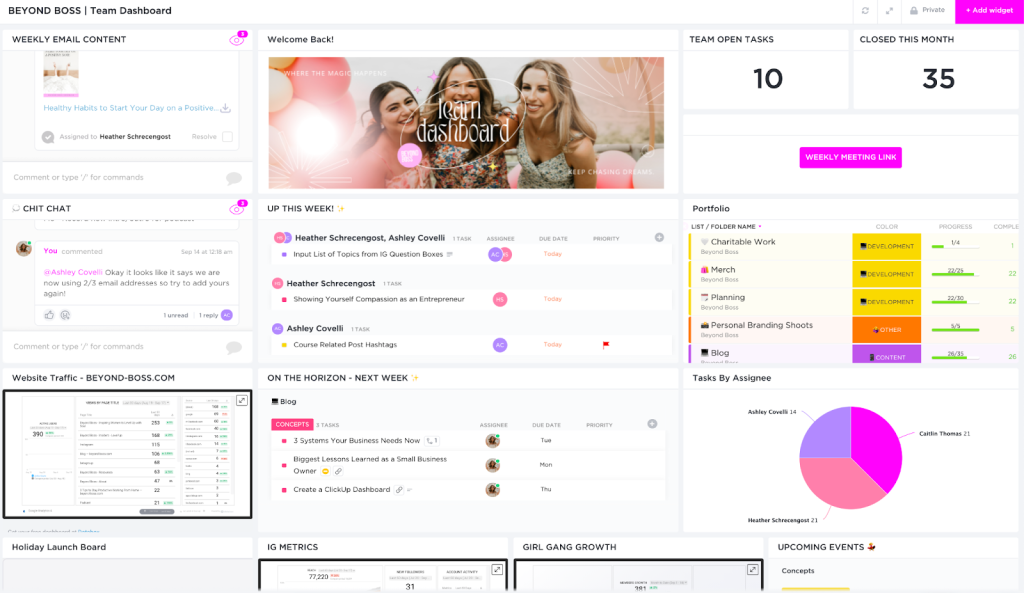
Image source: beyond-boss.com
ClickUp is a versatile project management and productivity platform designed for teams of all sizes. Like all successful customer retention tools, it offers a unified workspace to manage tasks, documents, goals, and more, making it ideal for businesses aiming to streamline operations and enhance collaboration.
Key features
- Customizable dashboards
- Task management with priorities and deadlines
- Time tracking and reporting
- Integrations with various third-party apps
- Combines CRM features with project management
Pricing
- Free Forever Plan: $0
- Unlimited Plan: $7 per user/month
- Business Plan: $12 per user/month
- Enterprise Plan: Custom pricing
2. Salesforce
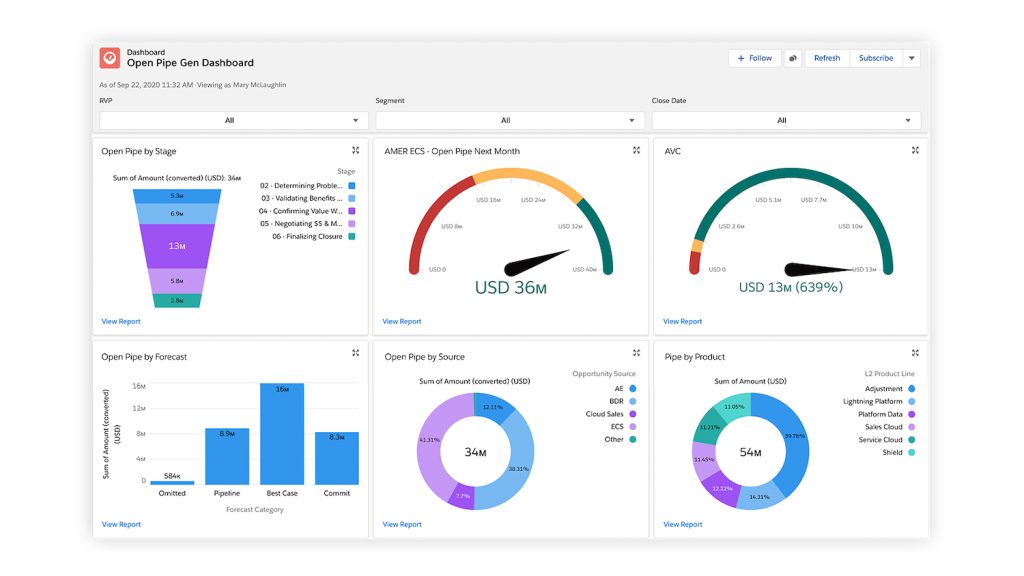
Image source: twistellar.com
Salesforce is a leading customer relationship management (CRM) platform that offers comprehensive solutions for sales, customer service, marketing, and more. It’s best suited for medium to large enterprises seeking robust CRM capabilities.
Key features
- Lead and opportunity management
- Customer service and support tools
- Marketing automation
- Analytics and reporting
Pricing
- Salesforce Essentials: $25 per user/month
- Professional: $75 per user/month
- Enterprise: $150 per user/month
- Unlimited: $300 per user/month
3. Productive
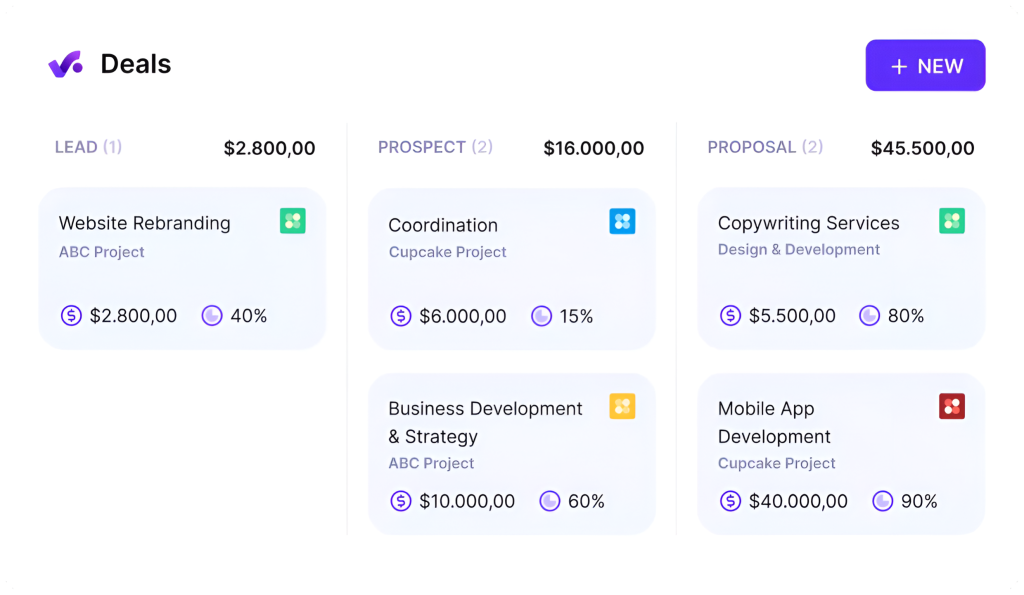
Image source: productive.io
Productive is one of the best tools for unified CRM project management. It is created by industry professionals to support agencies of all shapes and sizes, integrating CRM, project management, and financial tracking all in one place. It can help businesses drive customer retention through better visibility, collaboration, and data-driven decision-making.
Key features
- Sales CRM and automations
- Team collaboration with task management
- Various project views, including Gantt and Kanban
- Project budgeting and invoicing (integrations include Xero and QuickBooks)
- Real-time insights into key agency metrics like revenue, profitability, or utilization
Pricing
- Essential plan: $9 per user/month
- Professional plan: $24 per user/month
- Ultimate plan: $32 per user/month
Customer loyalty programs
4. Smile.io
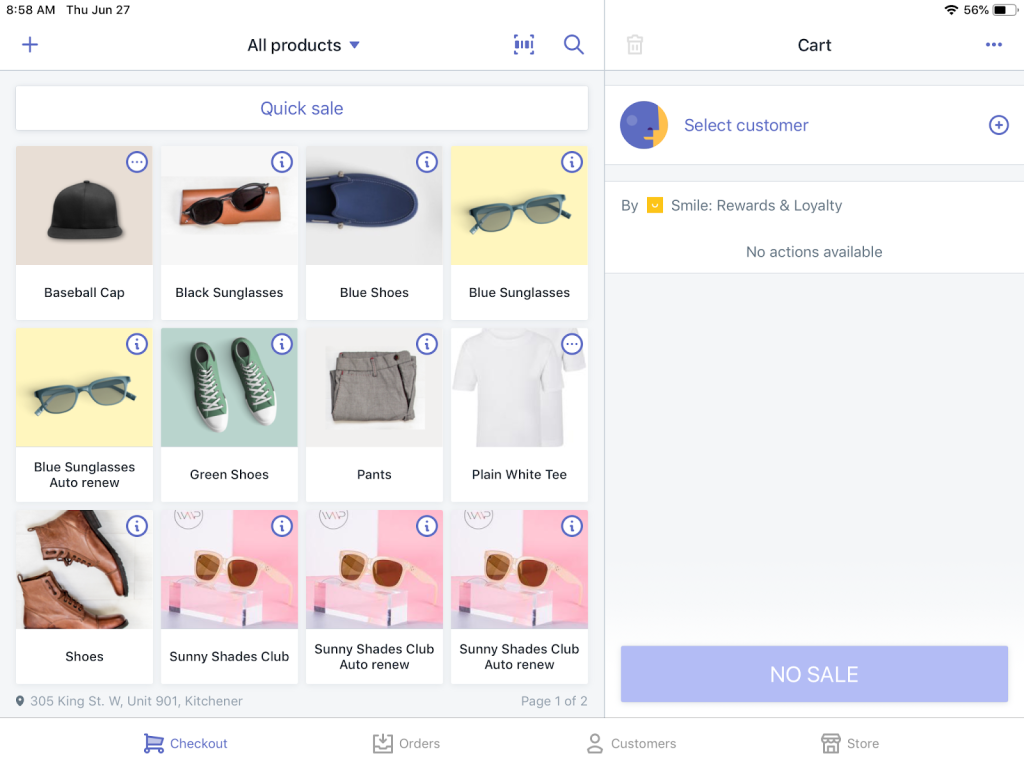
Image source: help.smile.io
Smile.io is a user-friendly loyalty program platform designed for small to medium-sized e-commerce businesses. It enables merchants to create and manage reward programs that encourage repeat purchases and foster customer loyalty.
Key features
- Points programs: Reward customers with points for various actions, such as purchases, social media engagement, and referrals.
- Referral programs: Encourage customers to refer friends by offering incentives for successful referrals.
- VIP programs: Establish tiered loyalty levels to reward top customers with exclusive perks.
- Customization: Tailor the appearance and functionality of the loyalty program to align with your brand identity.
Pricing
- Free plan: Basic features suitable for startups
- Starter plan: $49 per month, includes additional customization and analytics
- Growth plan: $199 per month, offers advanced features and integrations
5. LoyaltyLion
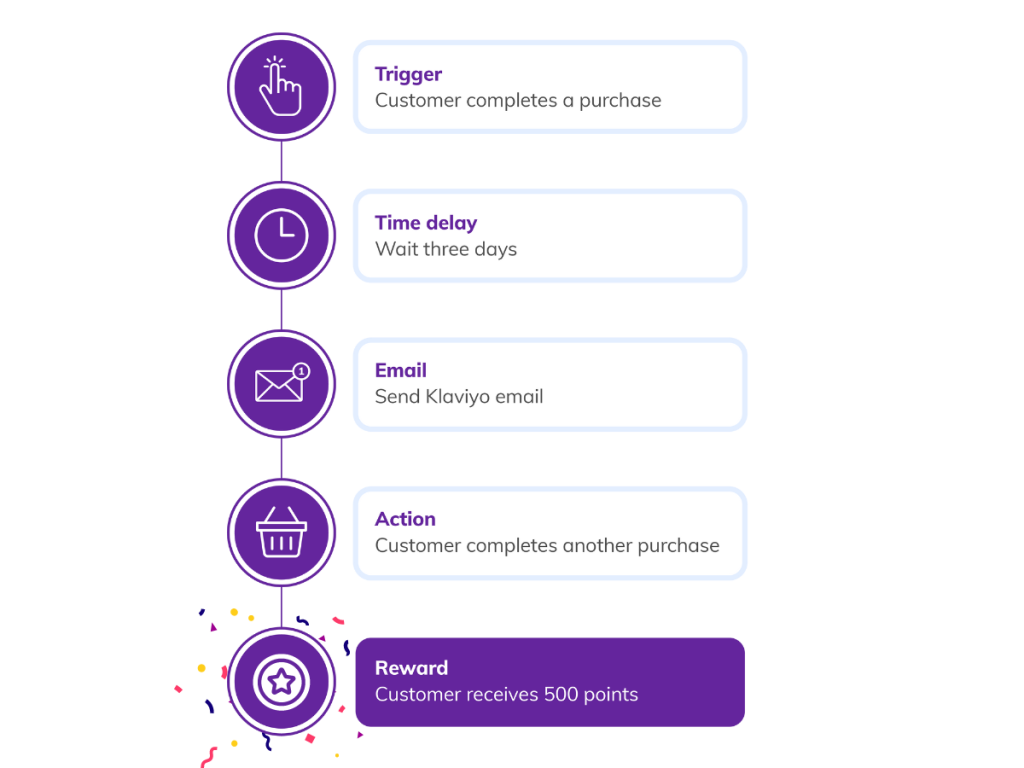
Image source: loyaltylion.com
LoyaltyLion enhances customer retention by creating personalized loyalty programs that reward customers for their purchases, referrals, and engagement. By integrating with e-commerce platforms, it enables businesses to offer tailored incentives, such as discounts or exclusive offers, fostering deeper connections with customers. This approach not only drives repeat purchases but also builds lasting brand loyalty, making it an essential tool for retaining e-commerce customers.
Key features
- Customizable rewards for various customer actions, including purchases, reviews, and social media shares
- Referral programs to encourage customers to bring in new clients
- Email integration for end personalized loyalty emails
- Analytics dashboard with access to detailed insights into program performance and customer behavior
Pricing
- Classic Plan: $199 per month for up to 2,000 orders
- Advanced Plan: Custom pricing
- Enterprise Plan: Custom pricing for businesses with higher order volumes
Gamification tools
6. Bunchball
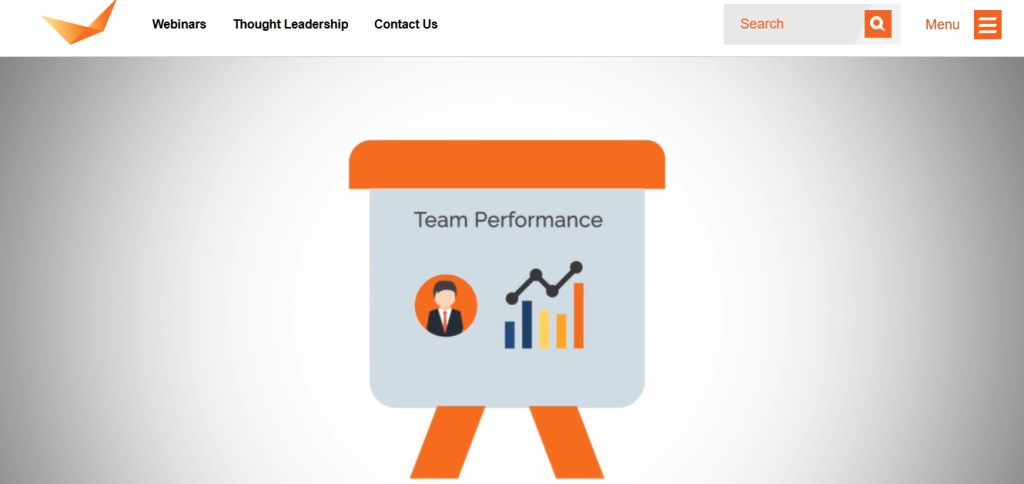
Image source: biworldwide.com
Bunchball is a gamification platform that fosters customer retention by using gamification to boost engagement and build loyalty. It integrates game mechanics into websites, applications, and social media, and it’s best suited for enterprises aiming to motivate employees, engage customers, and enhance learning experiences.
Key features
- Offers a comprehensive suite of gamification tools, including points, badges, leaderboards, and missions
- Provides insights into user behavior and engagement metrics
- Seamlessly integrates with existing systems and platforms
- Allows tailored gamification strategies to align with specific business objectives
Pricing
Bunchball offers customized pricing based on the specific needs and scale of the business. For detailed pricing information, contact Bunchball directly.
7. Gametize
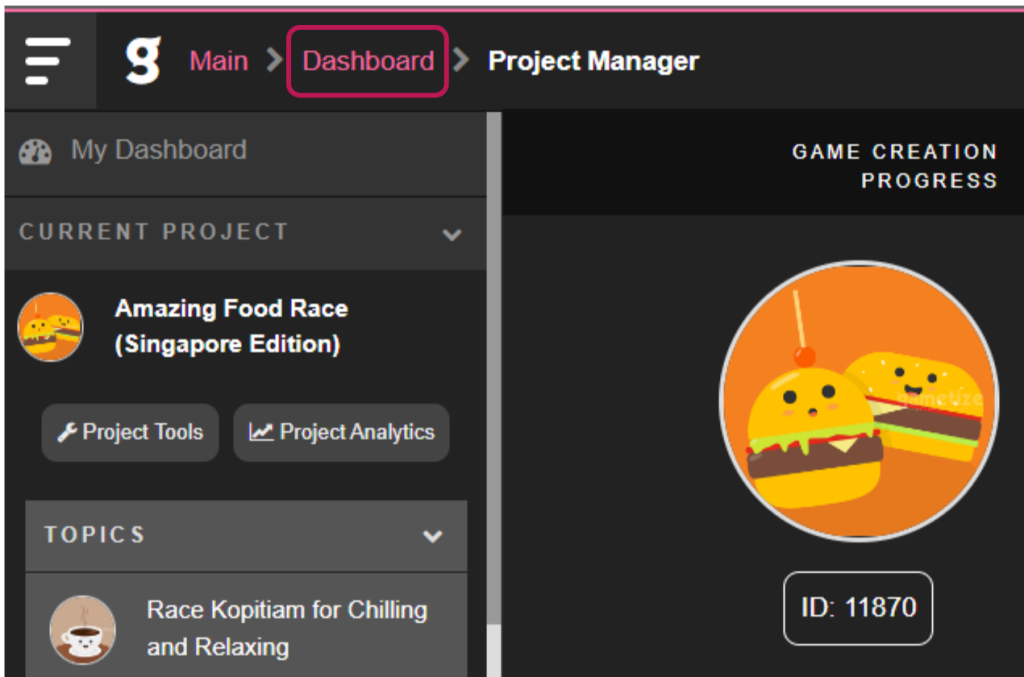
Image source: support.gametize.com
Gametize is an enterprise-grade gamification and white-label platform designed for community engagement, customer relations, talent acquisition, employee onboarding, learning & development, and compliance training. It’s ideal for organizations seeking to implement gamification strategies across various domains.
Key features
- Enables the design of various challenges, including quizzes, polls, and photo submissions
- Incorporates points, badges, and leaderboards to motivate users
- Facilitates community building through features like messaging, commenting, and liking
- Offers insights into user participation and engagement levels
- Provides customization options to align with brand identity
Pricing
- Basic Plan: Free
- Light Plan: $100/month or $1,200 annually
- Regular Plan: $200/month or $2,400 annually
- Premium Plan: $500/month or $6,000 annually
- Premium Plus Plan: $1,000/month or $12,000 annually
- White-label Plan: $12,000/year
Personalization tools
8. Dynamic Yield
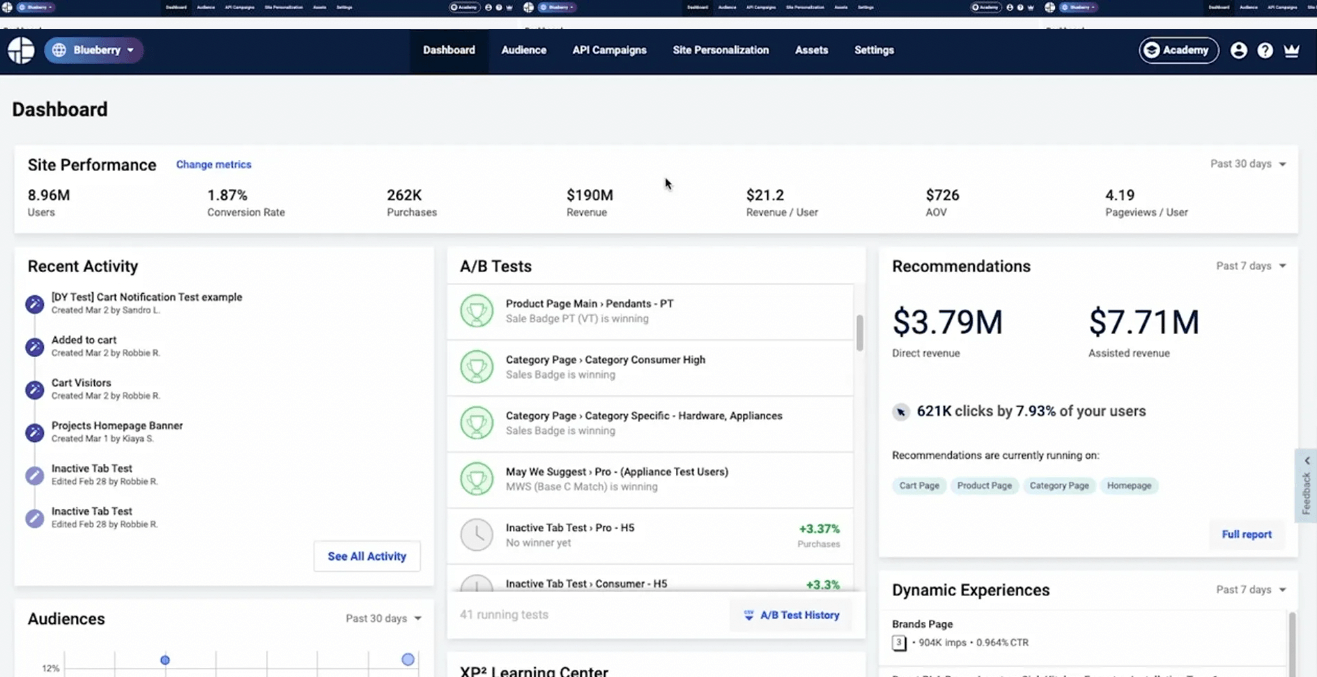
Image source: unreply.de
Dynamic Yield is an AI-powered personalization platform that enables businesses to deliver individualized experiences across the web, mobile apps, email, kiosks, IoT, and call centers. It’s best suited for medium to large enterprises seeking to enhance customer engagement through personalized content and recommendations.
Key features
- A/B testing and optimization
- Recommendation engine for personalized product or content suggestions based on user behavior
- Behavioral messaging based on real-time user actions
- Data Management Platform (DMP) for targeted personalization
Pricing
Dynamic Yield does not publicly disclose its pricing information. For detailed pricing, it’s recommended to contact Dynamic Yield directly through their official website.
9. Evergage (Salesforce Interaction Studio)
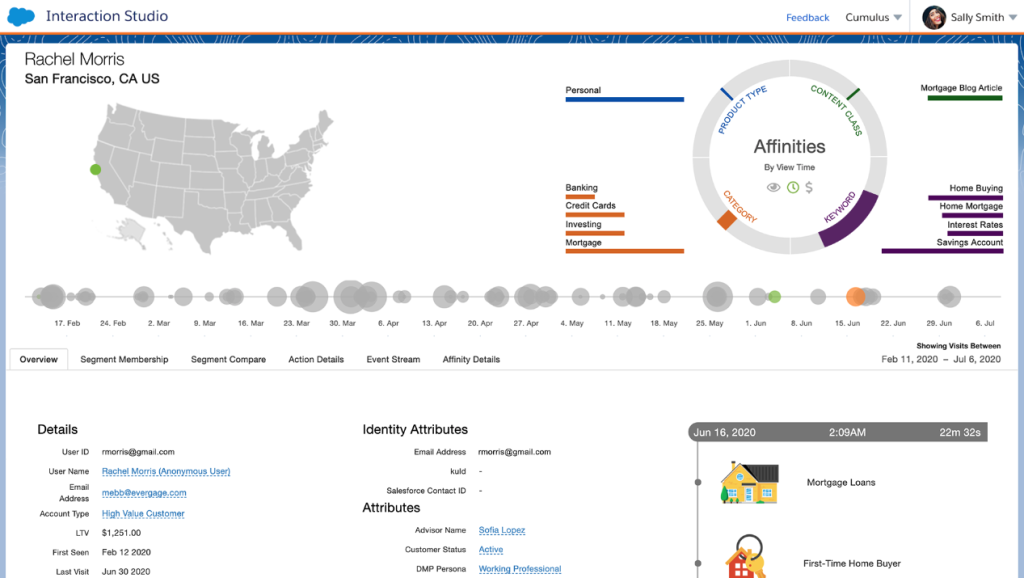
Image source: G2.com
Evergage, now known as Salesforce Interaction Studio, is a real-time personalization and interaction management solution. It enables businesses to deliver relevant, individualized experiences across channels, including web, mobile, email, and in-person interactions. It’s ideal for organizations aiming to understand and respond to customer behavior in real-time.
Key features
- Real-time behavioral tracking
- Personalized recommendations tailored to individual preferences
- Journey orchestration to manage customer journeys across multiple touchpoints
- A/B testing and optimization to identify the most effective approaches
Pricing
Salesforce Interaction Studio does not publicly disclose its pricing information. For detailed pricing, it’s recommended to contact Salesforce directly through their official website.
Automation tools
10. Textmagic
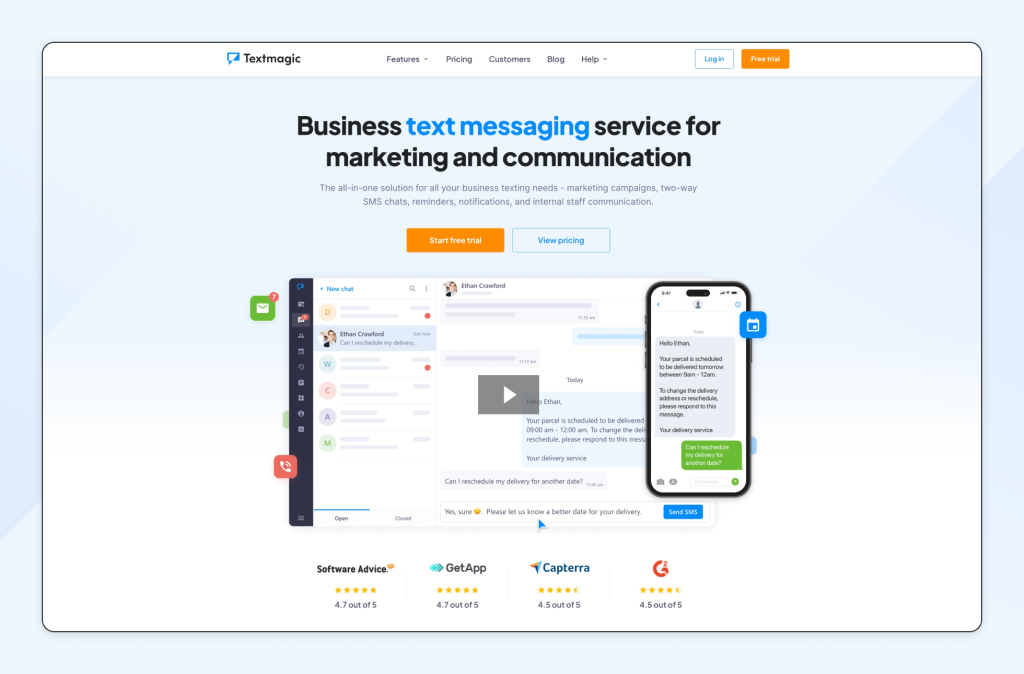
Image source: textmagic.com
Textmagic boosts customer retention by enabling personalized, timely communication through text messages. From reminders and exclusive offers to feedback surveys, it helps businesses stay connected and foster loyalty, making it ideal for companies seeking direct communication channels.
Key features
- Bulk SMS sending
- Two-way messaging
- SMS scheduling
- API integration
Pricing
- Essential Plan: A pay-as-you-go model starting at $24.50 for 500 texts, equating to 4.9¢ per text. This plan is ideal for businesses with occasional messaging requirements.
- Professional 2K Plan: A monthly subscription starting at $80 for 2,000 texts, reducing the cost to 4¢ per text. This plan suits businesses with consistent messaging needs.
- Connect 10K Plan: Designed for high-volume users, this plan starts at $100 for 10,000 texts, bringing the cost down to 1¢ per text. It allows integration with providers like Twilio or Vonage for additional flexibility.
11. Mailchimp
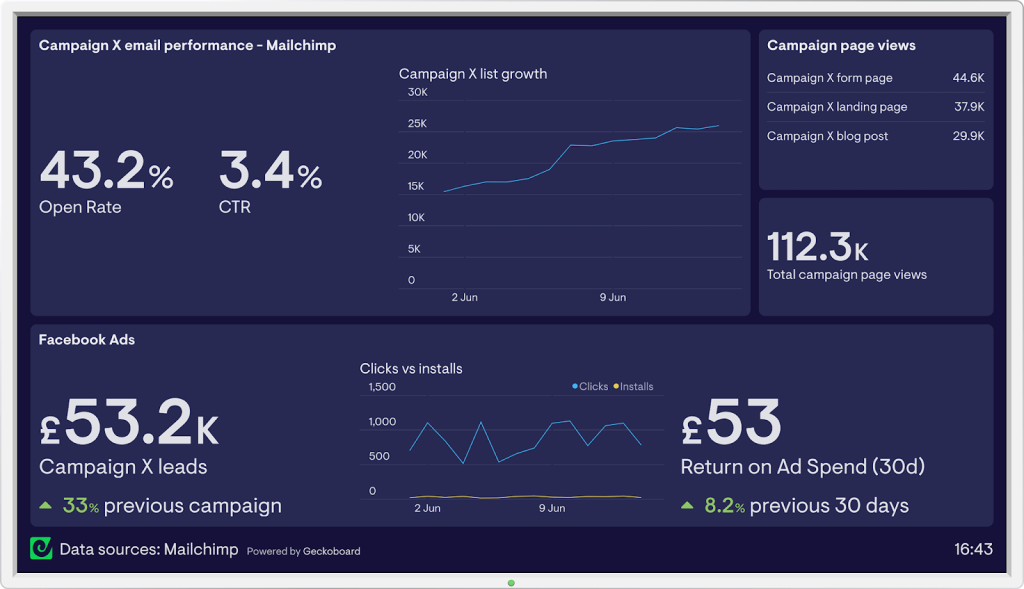
Image source: geckoboard.com
Mailchimp is an all-in-one marketing platform offering email marketing, automation, analytics, and customer retention tools. It’s best for businesses aiming to manage their marketing efforts and build long-term customer relationships from a single platform.
Key features
- Email campaign creation
- Marketing automation
- Audience segmentation
- Detailed analytics
Pricing
- Free Plan: Ideal for beginners, this plan allows up to 500 contacts and 1,000 email sends per month
- Essentials Plan: Starting at $13 per month for up to 500 contacts
- Standard Plan: Beginning at $20 per month for up to 500 contacts
- Premium Plan: Designed for advanced users, this plan starts at $350 per month for up to 10,000 contacts
Customer service and support software
12. Zendesk
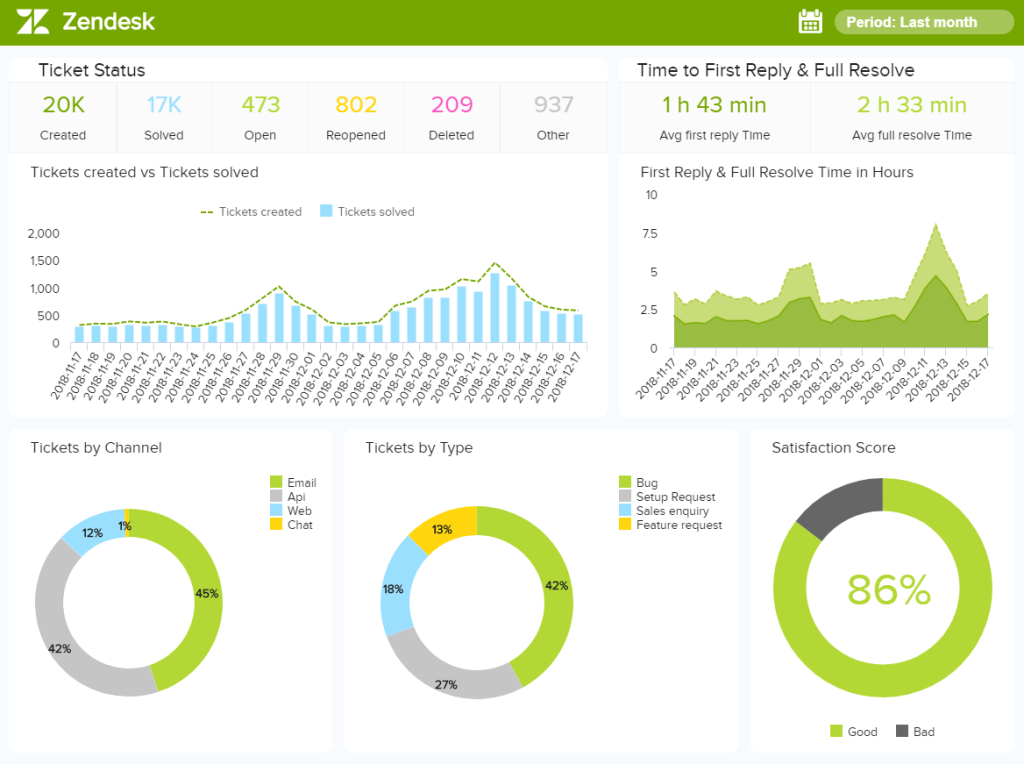
Image source: data1.skinnyms.com
Zendesk is a customer service and engagement platform offering support ticketing, self-service options, and customer analytics. It’s suitable for businesses focused on improving customer support experiences.
Key features
- Multi-channel support (email, chat, phone)
- Ticket management
- Knowledge base creation
- Customer satisfaction metrics
Pricing
- Zendesk Suite Plans: These comprehensive plans include ticketing, live chat and messaging, help center, and voice capabilities.
- Suite Team: Priced at $55 per agent per month (billed annually), this plan provides essential tools for delivering seamless, conversational service.
- Suite Growth: At $89 per agent per month (billed annually), it offers enhanced self-service and automation features to boost efficiency.
- Suite Professional: For $115 per agent per month (billed annually), this plan includes advanced collaboration tools, skills-based ticket routing, and analytics.
13. Freshdesk
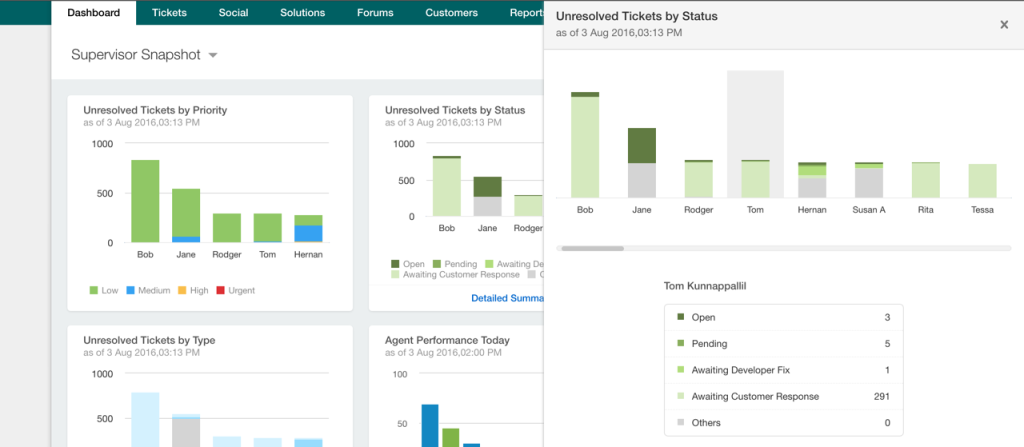
Image source: freshworks.com
Freshdesk is a cloud-based customer support software offering ticketing, collaboration, and automation tools. It enhances customer retention by streamlining support processes, ensuring timely issue resolution, and improving overall customer satisfaction, making it ideal for businesses seeking an intuitive support platform.
Key features
- Omnichannel support
- Team collaboration tools
- Automated workflows
- Reporting and analytics
Pricing
- Free Plan: Available for up to 2 agents, this plan includes essential features such as email ticketing, a knowledge base, and team collaboration tools.
- Growth Plan: Priced at $15 per agent per month (billed annually)
- Pro Plan: $49 per agent per month (billed annually)
- Enterprise Plan: $79 per agent per month (billed annually)
Customer feedback tools
14. SurveyMonkey
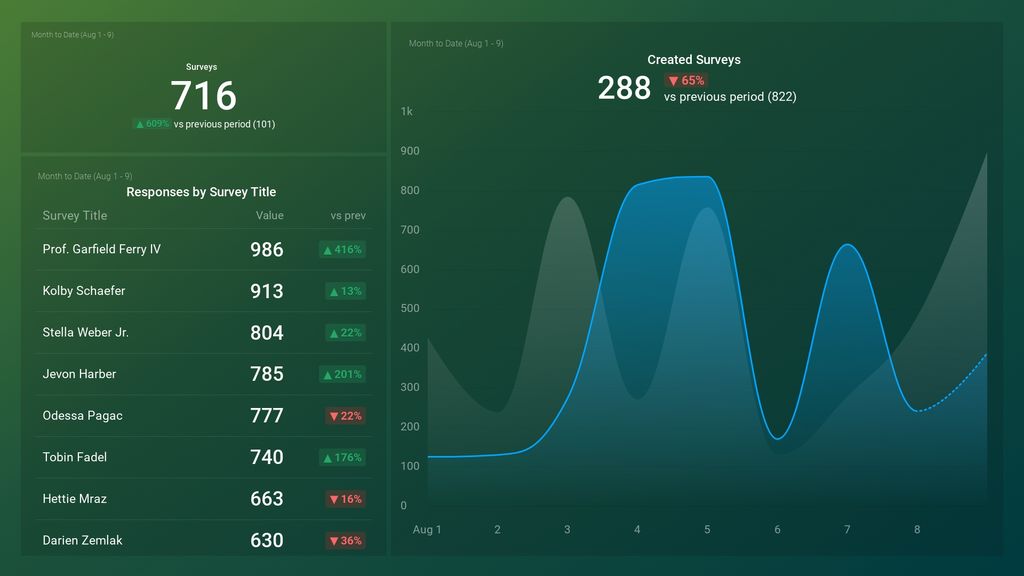
Image source: databox.com
SurveyMonkey is an online survey tool that supports customer retention by enabling businesses to gather valuable feedback, identify pain points, and make data-driven improvements. It’s best for companies aiming to understand customer satisfaction and areas for improvement.
Key features
- Customizable survey templates
- Real-time results analysis
- Integration with other tools
- Advanced survey logic
Pricing
- Basic (Free) Plan: Allows users to create surveys with up to 10 questions and view up to 25 responses per survey.
- Standard Monthly Plan: Priced at $39 per month
- Advantage Annual Plan: $36 per month (billed annually at $468)
- Premier Annual Plan: $99 per month (billed annually at $1,428)
15. Typeform
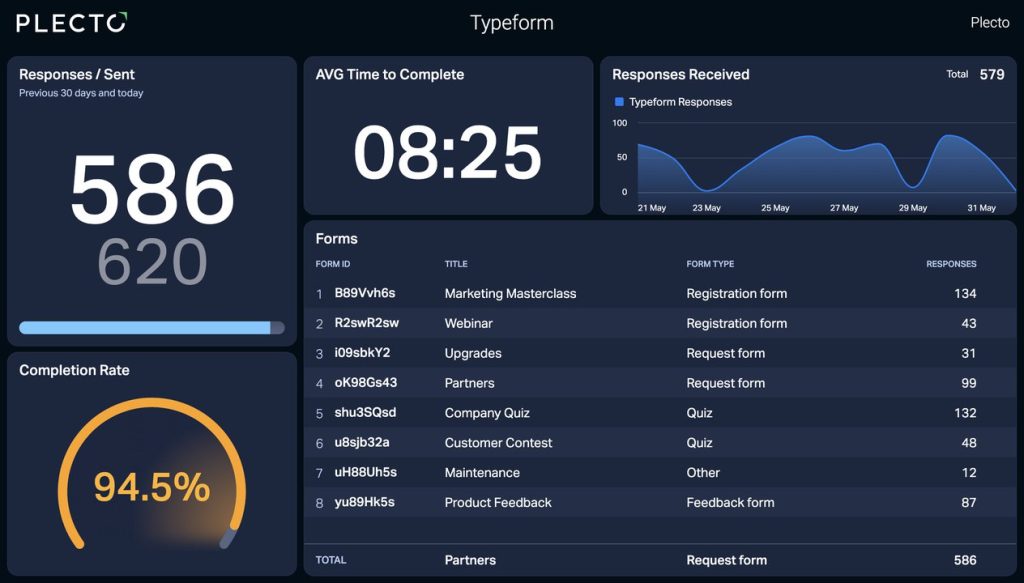
Image source: plecto.com
Typeform enhances customer retention by enabling businesses to gather customer insights through engaging and interactive forms. Its user-friendly design helps improve response rates, making it easier to understand customer needs and foster stronger relationships.
Key features
- Interactive form design
- Conditional logic
- Integration capabilities
- Analytics dashboard
Pricing
- Free Plan: Allows users to create unlimited forms with up to 10 questions each and collect up to 10 responses per month.
- Basic Plan: Priced at $25 per month, this plan includes features such as payment and file upload questions, with a monthly response limit of 100.
- Plus Plan: At $55 per month, it offers increased response limits and additional customization options.
- Business Plan: For $89 per month, this plan provides advanced features suitable for larger organizations.
Analytics and insights platforms
16. Google Analytics
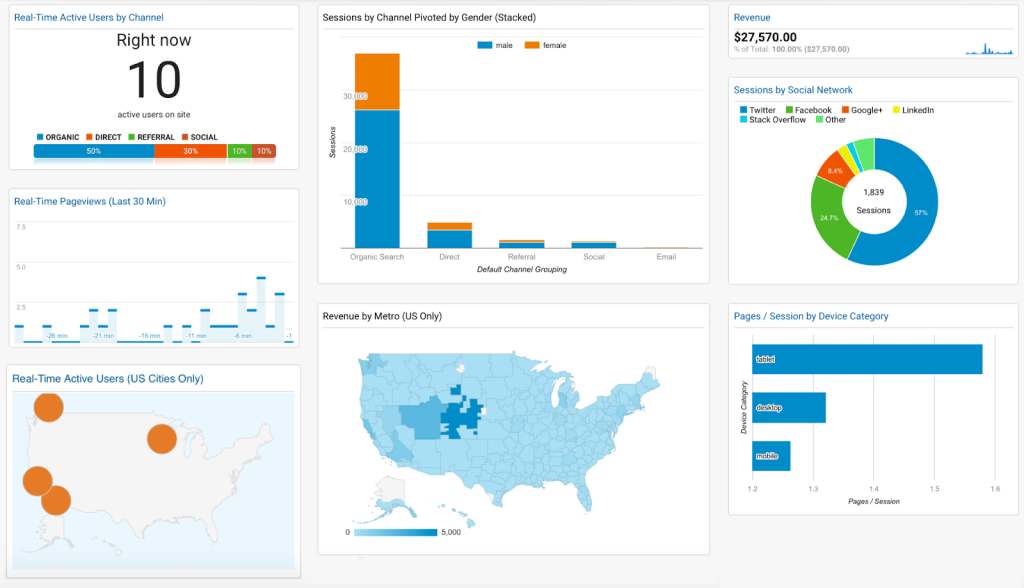
Image source: annlelytics.com
Google Analytics supports customer retention by providing insights into user behavior, allowing businesses to identify trends, optimize website experiences, and tailor strategies to keep customers engaged and returning. It’s essential for businesses aiming to understand customer behavior on their websites.
Key features
- Real-time data tracking
- Audience segmentation
- Conversion tracking
- Integration with other Google services
Pricing
Free; premium version (Analytics 360) available for enterprise needs.
17. Mixpanel
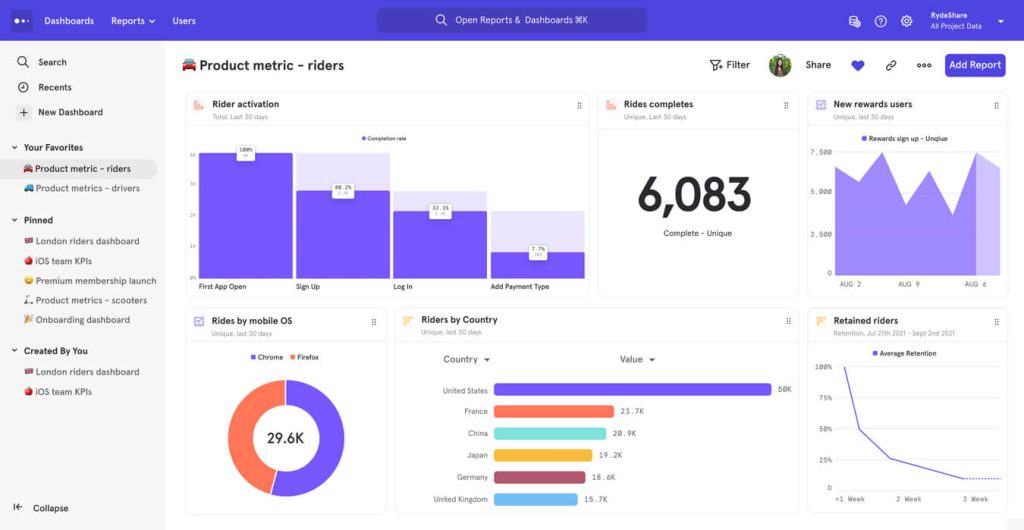
Image source: Mixpanel.com
Another successful customer retention tool is Mixpanel, an analytics platform specializing in tracking user interactions with web and mobile applications. Mixpanel enhances customer retention by enabling businesses to identify engagement patterns, optimize product features, and deliver tailored experiences that keep customers coming back.
Key features
- Event-based tracking
- Funnel analysis
- A/B testing
- User segmentation
Pricing
- Free Plan: Provides up to 20 million events per month, access to core reports (such as Insights, Funnels, Retention, and Flows), and unlimited data history.
- Growth Plan: Starts at $24 per month, offering advanced features like unlimited saved reports and cohorts, advanced sharing controls, and no-code data transformations.
- Enterprise Plan: Pricing is customized based on specific requirements.
Subscription management tools
18. ReCharge
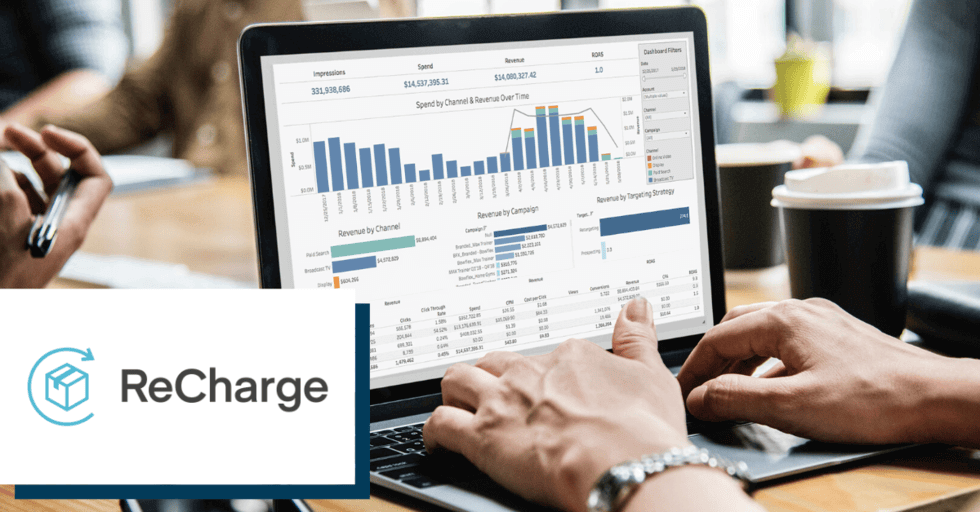
Image source: penpath.com
With its focus on subscription management, ReCharge enhances customer retention by streamlining recurring payments and enabling businesses to deliver tailored experiences.
Key features
- Subscription management
- Customizable billing options
- Customer portal
- Analytics and reporting
Pricing
- Standard Plan: Priced at $99 per month, plus a transaction fee of 1.25% + 19¢ per transaction.
- Pro Plan: Priced at $499 per month, plus a transaction fee of 1% + 19¢ per transaction.
19. Chargebee
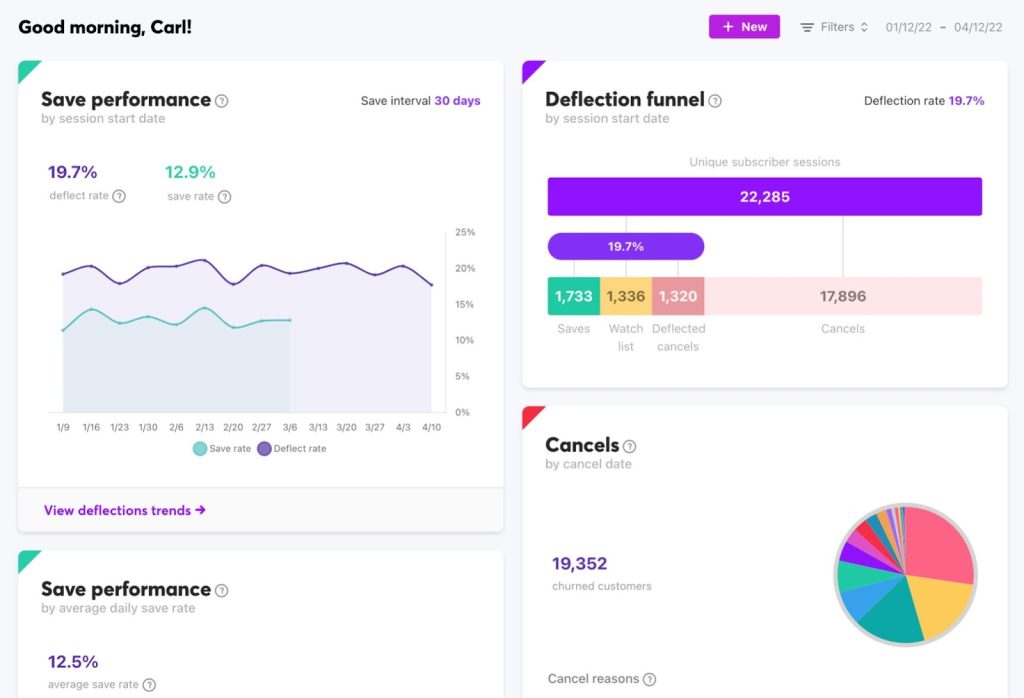
Image source: support.chargebee.com
Chargebee supports customer retention by simplifying subscription management and automating billing processes, ensuring a seamless experience that keeps customers engaged and satisfied.
Key features
- Subscription lifecycle management
- Automated invoicing
- Revenue recognition
- Integrations with various payment gateways
Pricing
- Starter: Free for the first $250,000 in cumulative billing; thereafter, a 0.75% fee on average.
- Performance: Priced at $599 per month, covering up to $100,000 in monthly billing; a 0.75% fee applies to overages.
- Enterprise: Custom pricing tailored to specific business requirements.
Social listening tools
20. Hootsuite
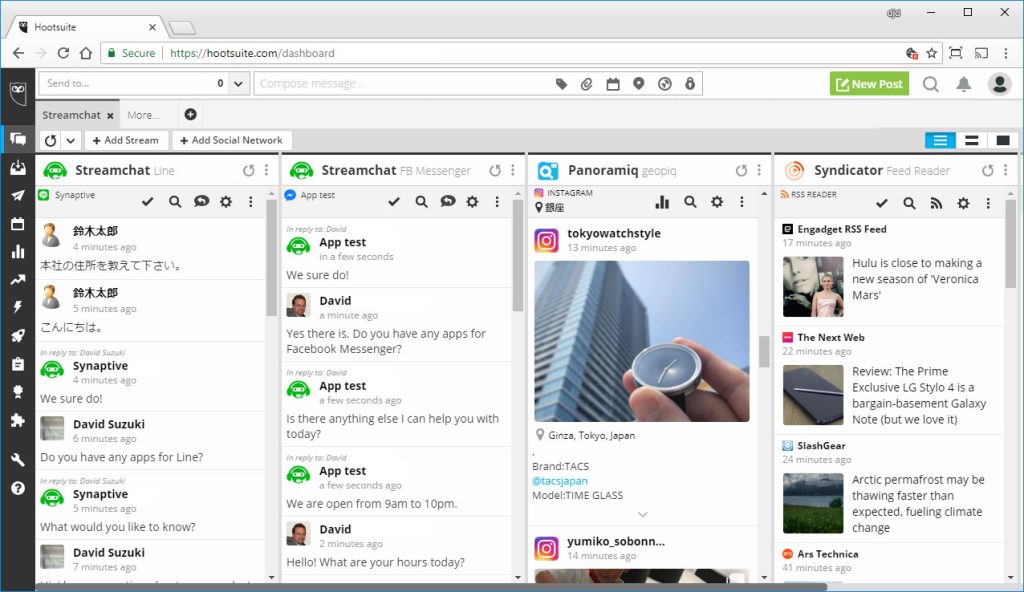
Image source: apps.hootsuite.com
Hootsuite is a comprehensive social media management platform that offers social listening capabilities. It’s designed for businesses of all sizes aiming to manage multiple social media accounts, schedule posts, and monitor brand mentions across various platforms. By promptly addressing customer feedback and engaging in relevant conversations, companies can improve customer satisfaction and foster loyalty.
Key features
- Customizable streams to monitor specific keywords, hashtags, or accounts across multiple social networks
- In-depth analytics to understand audience demographics, engagement metrics, and sentiment analysis
- Enhancing social listening capabilities by integrating with Talkwalker, allowing for broader monitoring across the web
Pricing
- Professional: Starting at $99 per month
- Team: Starting at $249 per month
- Business: Custom pricing
21. Brandwatch
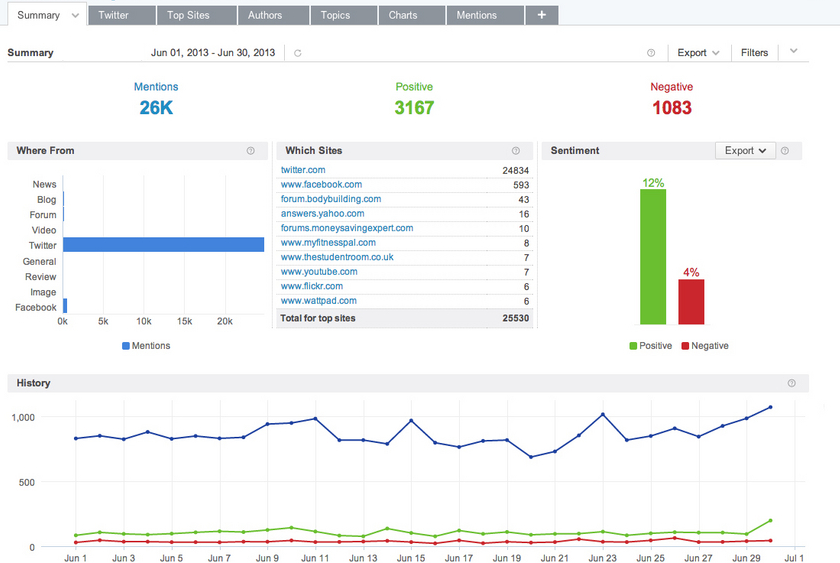
Image source: socialmediadata.com
Brandwatch is an advanced social listening and analytics platform tailored for enterprises seeking deep insights into online conversations. It empowers businesses to understand customer sentiments and emerging trends, enabling proactive engagement and strategy adjustments. This leads to enhanced digital customer experiences and improved retention rates.
Key features
- Data from over 95 million sources, including social media platforms, blogs, forums, and news sites.
- AI-powered sentiment analysis, trend detection, and audience segmentation to gain actionable insights.
- Tailored dashboards to visualize data and track key performance indicators relevant to your business.
Pricing
Brandwatch offers customized pricing based on specific business needs and data requirements. For detailed pricing information, contact Brandwatch directly through their contact page.
How to choose the right tool for your business
Selecting the right customer retention tool can feel overwhelming, but it all comes down to a few key factors that align with your unique business needs. Here’s how to make the perfect choice for your specific business profile.
- Assess user experience (UX): A tool may check all your boxes, but if it’s confusing or clunky, your team might struggle to use it effectively. Choose clean interfaces and intuitive navigation above anything else.
- Check for integrations: Ensure that the tool integrates smoothly with your existing platforms—your CRM, email marketing system, or POS. Look for tools that require less time updating databases, leaving you with more time to build customer relationships.
- Trial periods come first: A trial period gives you the chance to test the software with real customer data and see if it meets your needs. Does it deliver the value it promised? Trials answer that, plus they allow your team to experience the tool’s usability, so everyone’s comfortable with it before making a financial commitment.
- Stay true to your industry: Different industries have different customer needs. For example, e-commerce might need a tool with abandoned cart recovery, while a subscription service might benefit from tools that prioritize churn prediction and reduction.
- Establish retention goals: If your primary goal is reducing churn, seek a tool with predictive analytics and early warning alerts. For goals around building brand loyalty, opt for tools that excel at personalization and engagement through tailored messaging.
Best practices for using retention tools effectively
To get the most out of your customer retention software, you need to work smarter, not harder. Here is how to maximize the potential of your retention tools and drive genuine customer loyalty:
- Divide and conquer: Don’t treat all customers the same; segment them based on demographics, purchase history, or engagement level. For instance, you can create separate campaigns for loyal customers and those who haven’t engaged in a while.
- Keep it personal: Use the data provided by your retention tool to personalize communications at every touchpoint. Instead of a generic “We miss you” email, reference specific products they liked or previous purchases.
- Let analytics lead the way: Identify potential drop-off points using your retention tool of choice. If you notice a spike in churn after a particular point in the customer journey, dive deeper to find the cause.
- Automate, automate, automate: Set repetitive but impactful actions on auto, like follow-ups, birthday messages, or loyalty rewards. This consistent communication won’t require constant manual input, freeing up your team to focus on more strategic tasks while keeping customer engagement steady.
Conclusion
If you’ve come this far, you realize that customer retention tools are no longer a luxury, an option, or part of a future project; they’re the competitive edge that separates thriving businesses from the ones struggling to keep up.
This article provides retention options that align with your goals, simplify your workflows, and genuinely resonate with your audience. By pointing out that retention isn’t just a tactic, it becomes clear that it has become a mindset that is crucial for keeping your brand relevant and your customers coming back for more.
We’d love to hear what tools you tried and what worked — or didn’t work — for you. Let us know your thoughts on making customer loyalty a top priority.
Frequently Asked Questions (FAQs)
Customer retention frameworks are systems that outline how to maintain long-term relationships with existing customers.
They often consist of multiple touchpoints, from follow-up communications and feedback loops to loyalty programs and predictive analytics.
While there’s no one-size-fits-all answer, a benchmark customer retention rate of around 75% is considered realistic across most industries.
Companies in sectors with high customer involvement, such as B2B or SaaS, often reach higher rates, while consumer goods may trend slightly lower.
Retention KPIs include repeat purchase rate, churn rate, customer lifetime value, and net promoter score.
A CRM system centralizes key data like purchase history and support interactions, helping you build closer relationships. This makes it easier to anticipate customer needs and maintain consistent value, resulting in more repeat business.
Related articles
60+ SMS and email statistics: Why using both channels works better
SMS gets opened by 82% of recipients within minutes....
Top 20+ B2B lead generation tools to supercharge your sales
Customer relationship management (CRM), email market...
Omnisend vs. Textmagic: Which platform is right for your business?
To build genuine customer relationships, businesses ...
Creating effective SOPs: 10 Templates and step-by-step writing guide
Standard operating procedures (SOPs) help ensure tha...
Are you tracking the right email KPIs? A reality check for small businesses
Small business owners and marketers wear multiple ha...



